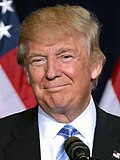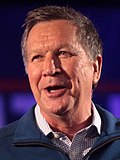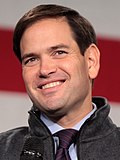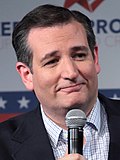The 2016 Vermont Republican presidential primary was held on March 1, 2016, along with ten other state nominating contests during Super Tuesday.
| |||||||||||||||||||||||||||||||||||||||||
16 pledged delegates to the 2016 Republican National Convention | |||||||||||||||||||||||||||||||||||||||||
|---|---|---|---|---|---|---|---|---|---|---|---|---|---|---|---|---|---|---|---|---|---|---|---|---|---|---|---|---|---|---|---|---|---|---|---|---|---|---|---|---|---|
| |||||||||||||||||||||||||||||||||||||||||
 | |||||||||||||||||||||||||||||||||||||||||
Donald Trump held a big edge in Vermont polls, with John Kasich and Marco Rubio splitting much of the rest of the vote.[1] However, on election day, Donald Trump only narrowly won the popular vote by 2.3%, and tied with John Kasich in the delegate count.
Polling
edit| Poll source | Date | 1st | 2nd | 3rd | Other |
|---|---|---|---|---|---|
| Primary results | March 1, 2016 | Donald Trump32.34% | John Kasich30.01% | Marco Rubio19.08% | Ted Cruz 9.61%, Ben Carson 4.13%, Jeb Bush 1.79%, Rand Paul 0.68%, Chris Christie 0.58%, Carly Fiorina 0.34%, Rick Santorum 0.27% |
| Castleton University/Vermont
Public Radio[2] Margin of error: ± 9.01% Sample size: 118 |
February 3–17, 2016 | Donald Trump 32.4% |
Marco Rubio
16.9% |
Ted Cruz
10.5% |
John Kasich 10.0%, Jeb Bush 7.7%, Ben Carson 3.1%, Chris Christie 2.4%, Carly Fiorina 1.0%, Rick Santorum 0.6%, Someone else 3.3%, Not sure/Don't know 12.1% |
Results
edit| Candidate | Vote[3] | Delegates[4] | |
|---|---|---|---|
| # | % | ||
| Donald Trump | 19,974 | 32.52 | 8 |
| John Kasich | 18,534 | 30.17 | 8 |
| Marco Rubio | 11,781 | 19.18 | 0 |
| Ted Cruz | 5,932 | 9.66 | 0 |
| Ben Carson | 2,551 | 4.15 | 0 |
| Jeb Bush (withdrawn) | 1,106 | 1.80 | 0 |
| Rand Paul (withdrawn) | 423 | 0.69 | 0 |
| Chris Christie (withdrawn) | 361 | 0.59 | 0 |
| Carly Fiorina (withdrawn) | 212 | 0.35 | 0 |
| Rick Santorum (withdrawn) | 164 | 0.27 | 0 |
| Write-ins | 390 | 0.63 | 0 |
| Total valid votes | 61,428 | 100% | 16 |
Delegates were awarded to candidates who got 20% or more of the vote proportionally.
Analysis
editVermont's voter base is much more moderate and irreligious than the Southern Super Tuesday contests.[5] Exit polls by Edison Research showed this benefitted Trump and Kasich: Trump carried somewhat conservative voters with 35% of the vote, but John Kasich won moderates with 40% to Trump's 34%.[6] Kasich did particularly well in the populous Burlington metro, holding Trump to a narrow margin statewide.
Turnout dropped in the Vermont Republican primary compared with 2012, as some registered Republicans crossed over to vote for favorite son Bernie Sanders in the Democratic primary.
See also
editReferences
edit- ^ Cox, Amanda; Katz, Josh; Quealy, Kevin (March 1, 2016). "Who Will Win Super Tuesday? Live Estimates of Tonight's Final Republican Delegate Count". The New York Times. ISSN 0362-4331. Retrieved June 19, 2022.
- ^ "The VPR Poll: The Races, The Issues And The Full Results". The Castleton Polling Institute. February 22, 2016. Retrieved February 23, 2016.
- ^ "VT Elections Database » 2016 President Republican Primary". VT Elections Database. Retrieved June 17, 2020.
- ^ "Vermont Republican Delegation 2016". www.thegreenpapers.com. Retrieved June 17, 2020.
- ^ Lipka, Michael. "A closer look at religion in the Super Tuesday states". Pew Research Center. Retrieved June 19, 2022.
- ^ "2016 Election Center". CNN. Retrieved June 19, 2022.



